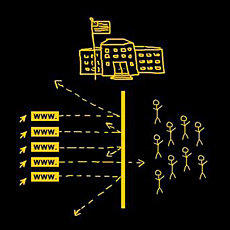 In the early days of internet at my high school Net Nanny programs handily blocked many of my tame searches for the likes of “gay pharoah” or “breast cancer” (yes, breast was blocked in the 90s). Not someone who regularly works with teenagers I don’t really know how restrictive today’s internet is in secondary schools. But one thing is becoming fairly clear, not all access is created equal.
In the early days of internet at my high school Net Nanny programs handily blocked many of my tame searches for the likes of “gay pharoah” or “breast cancer” (yes, breast was blocked in the 90s). Not someone who regularly works with teenagers I don’t really know how restrictive today’s internet is in secondary schools. But one thing is becoming fairly clear, not all access is created equal.
The American Civil Liberties Union (ACLU) has launched a project that asks public high school students to inform them if their school blocks access to pro-gay websites and doesn’t anti-gay websites.
“Students may not realize that it actually is illegal for their schools to block educational and political content geared toward the LGBT community,” said Joshua Block, staff attorney with the ACLU LGBT Project. “With this initiative, we hope to inform students of their rights, and let them know there is something they can do if their school is engaging in censorship.”
The tactic is smart. Empower young people to research and defend their own rights while giving them a strong support. They’ve even created a survey to help students determine if their schools block LGBTQ sites as well as a video explaining the process (see below). It’s made by “the intern” and is actually fairly amusing for a serious grown-up organization like the ACLU.
Most recently the ACLU has contact schools in Michigan, Texas, Pennsylvania and Virginia demanding they stop viewpoint-based censorship of web content geared toward LGBT communities.
Several students reported to the ACLU that they had persuaded their schools to override the filters and grant access to websites on an individualized basis, but they felt it was burdensome and insulting to have to request special permission every time they sought to access a new website that had been blocked by the anti-LGBT filter.
“Unblocking individual sites is not a viable solution,” said Block. “As long as the anti-LGBT filter is in place, students will be confronted with a demeaning and stigmatizing message that the site has been blocked on account of its LGBT-related content. It’s unfair to put students in the difficult position of asking special permission before being allowed to access LGBT viewpoints. Public schools have a duty to provide students with viewpoint-neutral access to the Internet.”

